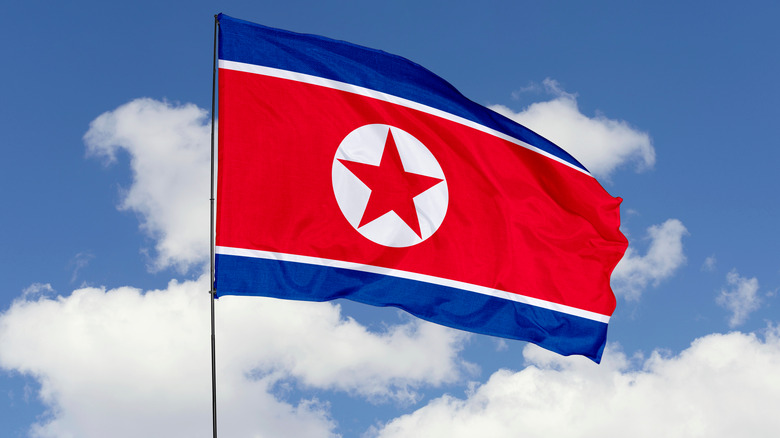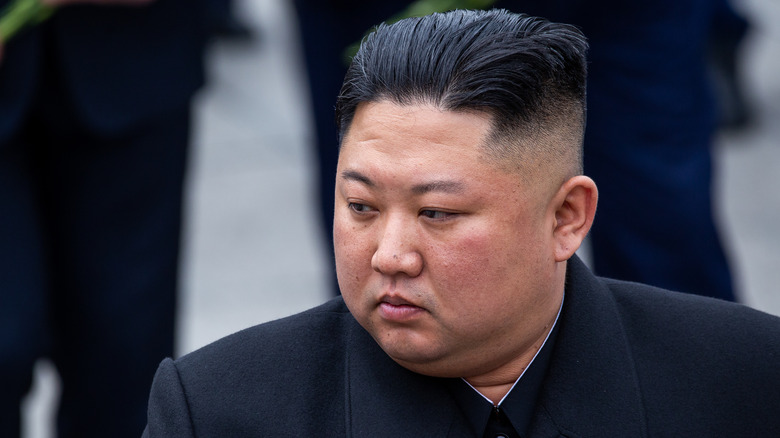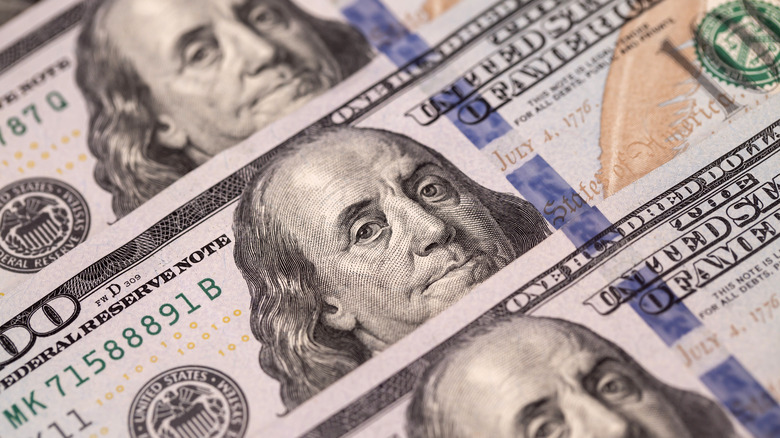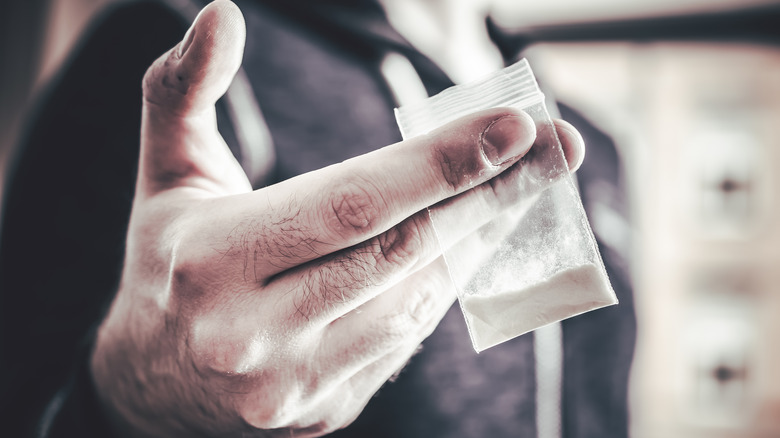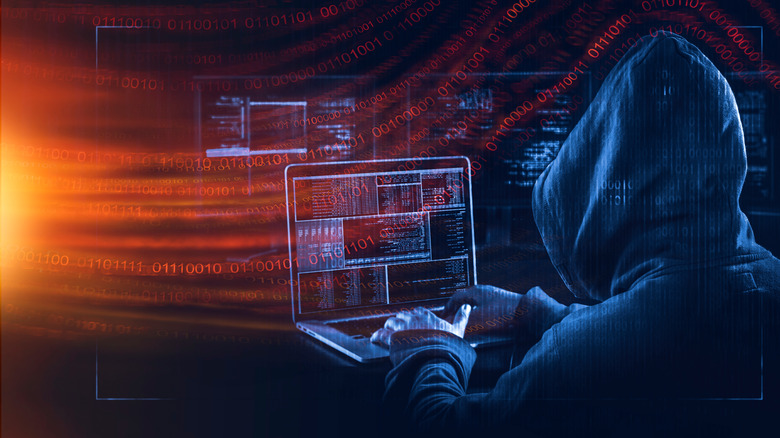Inside North Korea's Secret World Of Organized Crime
The modern world seems to have a romantic fascination with organized crime. "The Godfather" probably had a lot to do with that, and isn't that how we usually think of organized crime syndicates? We imagine the Italian mobsters that ruled New York and Chicago, charming the locals with a smile while extorting business down the block for "protection" money. On occasion, we get the Eastern European and Russian mobsters as bad guys or side characters in movies, but even then, it's rare to see a film featuring this type of mobster in the forefront. Even rarer still is to see an Asian mafia brought into a story that isn't part of the "Rush Hour" franchise, and when they do get the highlight, it's almost always the Yakuza from Japan or the Triad out of China. You've likely heard of those organizations, at least in passing. But have you ever heard of a North Korean mafia?
According to a report from the Congressional Research Service, North Korea has been a big player in the organized crime world for a while, and the activities are believed to earn at least a $500 million paycheck each year. That's a hefty chunk of change for a secret world of organized crime you've probably never heard of. They have skills, they have cunning, and they're not quite what you'd expect of an organized crime syndicate.
The government is the criminal organization
We know the world of organized crime often has ties with government entities. We've seen it in every fictional crime film and read about it in every fictional crime novel, so we expect the real-life versions of these mobsters to have some of those similar ties. What we don't necessarily expect is for a nation's government to actually be the criminal organization itself, but if the evidence that's presented by media reports, the United States government, and defecting North Korean nationals is to be believed, that's exactly what's going on in the country.
In 2018, an upper-level North Korean official turned on his country and like so many others, defected. Defectors seem to be one of the most valuable sources of information on the topic of North Korean organized crime. As Australian Broadcasting Corporation explains, the defector worked in "Office 39," which gave him a front-row seat to the criminal action. Office 39 is responsible for making sure North Korea's Supreme Leader Kim Jong-un (above) and other top tier officials are stocked with cash, specifically a stockpile of foreign currency. This stockpile is known as the "revolutionary fund," though it operates more as a slush fund for the dictator, which was the intention behind Office 39's dealings when Kim Il-sung set it up in the '70s. Office 39 is about as shady as they come, since much of the money they stockpile comes from international organized crime of differing varieties.
Maybe the best counterfeiters around
You'd be pretty hard pressed to create a functional counterfeit US $100 bill with the printing gear you have at home, and even if you were one of the best street-level counterfeiters around, you probably aren't going to get your fake money into banks or even most grocery stores. Most cashiers these days are armed with those fancy highlighters that turn colors when they mark a counterfeit. As Atlanta Gold & Coin explains, there are several things that make American bills so hard to counterfeit well, from the color-shifting ink down to microprinting, watermarks, and a special security thread woven into the paper of the bills. But some fakes are better than others, and, according to Insider, the U.S. government thinks North Korea is behind the best.
The website says North Korea has produced counterfeit $100 bills for decades, injecting them into the economies of several foreign countries, which the Congressional Research Service accounted for a profit of up to $25 million per year. After the arrest of a counterfeit smuggler and president of the Irish Workers Party in 2005, as Vice notes, and the subsequent accusations about North Korea providing the fake bills, the counterfeits disappeared until a new, almost perfect fake popped up in South Korea in 2017.
Both the United States government and the United Nations accused North Korea of producing counterfeit currency, and if the country was doing so, it could've been an attempt to destabilize the U.S. economy.
They play a major role in the drug trade
We've heard rumors of governments getting involved in the drug trade before, like the alleged activity between the CIA and the South American drug cartels (per the U.S. Department of Justice's Office of the Inspector General). North Korea seems to have its own role in this illicit global enterprise. They also don't seem to be very picky about where their money comes from, as long as it's flowing to the head of state.
According to a high-level defector interviewed by BBC, the drug trade is a major part of North Korea's secret income, reaching its peak when Kim Jong-il's "revolutionary fund" went broke during a major famine in 1991. The product of choice for the North Korean government? Methamphetamines, or "ICE" as it was popularly referred to in the '80s and early '90s. The defector said he was the one who set up the facility that made it all happen, and it could've easily made for a season plot arc of "Breaking Bad." The defector, whose real name is unknown, said he snuck in three foreign drug makers to produce the stuff in a secret lab at the Workers' Party's liaison office.
As The New York Times points out, diplomats from North Korea have been arrested several times in various places around the globe for smuggling the country's drugs, and these incidents date back over 40 years. It's probably fair to say North Korea had the "Breaking Bad" market covered long before the show came around.
Insurance fraud and the hacker army
The North Korean government's involvement in organized crime seems to grow so much bigger every time you look at it. They've been involved with everything from terror to weapons trade, to more white-collar crimes like insurance fraud, to stealing money electronically via their hacker army.
According to another high-level North Korean defector (via UPI), his country of origin had been scamming about $10 million per year from the insurance market for roughly 30 years, and they're able to continue this practice because there's only one state-owned insurance company. That means when they fake an accident, they're the only ones who can say whether the claim is real or a scam. It's easy to see which way that goes.
Another defector tells Bloomberg of the hacker army North Korea has sent across the world in secret to steal or scam global citizens of at least "$100,000 a year" per hacker, per year, minimum — the hackers got to keep less than 10% — and these black hats are very good at their jobs. They were responsible for the WannaCry ransom attack in 2017 that wreaked serious havoc on hard-drives if the victims didn't cough up $300 in Bitcoin, for example. The attack, according to Kaspersky, caused $4 billion in total damages, courtesy of the North Korean government's organized crime syndicate.
